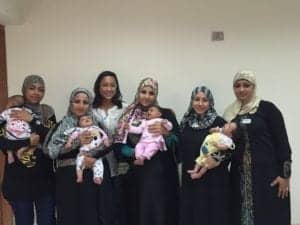As a fundraiser for Women’s World Banking, I cultivate support for our global projects. A critical part of my job during funding and project negotiations is to represent the real issues facing our partners’ clients, particularly low-income women. The needs of these women sometimes get lost in the minutiae of log frames, work plans, disbursement and the like. That’s why meeting our partners, and hearing their clients’ stories firsthand is so important.
A few months ago, I joined our Microinsurance and Consumer Insights & Engagement teams in Cairo to conduct the pilot assessment of the Hemaya microinsurance product with our in-country partner, Lead Foundation. During this phase of the project, we gather both quantitative and qualitative data to understand what is and isn’t working for the clients and the institution. We use these learnings to modify product features, operational systems and marketing collateral, with the ultimate goal of successfully rolling out the product to Lead Foundation’s eighteen branches and more than 150,000 clients.
Meeting clients at Dar El-Salam
The final client focus group for the qualitative research portion of the assessment took place at Lead’s branch in Maadi, an affluent suburban area of Cairo. The women interviewees, however, live and work in Dar El-Salam, one of Egypt’s five poorest districts according to United Nations Development Programme’s Human Development Report. All but one had recently given birth to a child “no more than 40 days ago.” The women, unsure about the questions they were about to be asked, sat at the pre-arranged tables, and smiled nervously at us as we prepared for the focus group.
“If you don’t have money in this country, you will die.”
Introductions were made, and after a brief explanation about our purpose, the women shared their experiences and opinions about Hemaya. Some thought that the benefits were helpful and offset income loss due to hospitalization, while others found the payout covered minimal out-of-pocket expenses or were not even aware of the services available to them. One client was planning to use the cash to pay back the neighbor she borrowed from to pay for her C-section surgery.
Hemaya microinsurance is making a difference
As I documented their stories, I felt guilty for having access to a steady income, options for medical care and (sometimes) easy-to-use ground transportation in New York City. This was my first field mission with Women’s World Banking and it was a challenge to remain objective during this information-gathering process. These were real women sharing their daily hardships of struggling to care for themselves and their families. But, they were here to make a difference, as we were, and keeping a clear head was vital to collecting their feedback. Lead was an incredible partner throughout this mission and their staff’s commitment to their clients, and to the success of this microinsurance product, continues to inspire me daily.
“It’s an insurance system. It’s for the future.”
After three long days, we completed the interviews, and on the last day, Women’s World Banking provided recommendations to Lead for the full roll-out of the product over the next few months. Hemaya is a first-of-its kind initiative in Egypt: a fully non-subsidized health insurance scheme being distributed through a financial intermediary and underwritten by a commercial insurer. Client enrollment of the product is rising steadily and Lead is on track to have Hemaya available at all branches before the end of the year.
Representing “the real deal”

About Lead Foundation
Lead Foundation (Lead) is an Egyptian Non-Governmental Organization (NGO) that was founded in 2003. It specializes in the delivery of microfinance services to Egypt’s economically active poor and operates in the Greater Cairo area through eighteen branches. Their aim is to create positive social and economic impact by targeting low-income entrepreneurs especially women who do not have access to institutionalized financial services.
This project benefits from the Agence Française de Développement support. The analysis, views and opinions expressed are those of the author and do not necessarily reflect the position of the Agence Française de Développement.



